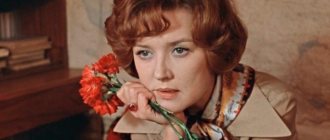Childhood and youth
A native Muscovite, Margarita Mitrofanova was born into an intelligent and, as she jokes, “talking” family. Dad is a lawyer, mom is a teacher at the Faculty of Philology. Both parents received higher education at the prestigious Moscow State University. My father became an assistant professor at the Faculty of Law, my mother taught students. Parents, intellectuals and scholars, considered it their duty to give their daughter a good education.
Margarita Mitrofanova
Rita attended a school in the capital, where she studied English in depth from the 2nd grade. After 2-3 years, the girl added another passion to English – music. My father brought a car radio from a business trip, and with it cassettes with recordings of cult groups The Beatles and ABBA, unknown to Margarita. The radio remained in the house. They bought speakers for it, and music sounded continuously in the Mitrofanovs’ home.
Margarita Mitrofanova in her youth
Margarita learned to understand music, she developed a musical taste. In 1987, the Muscovite graduated from an English special school and, at the insistence of her father, entered the Faculty of Law of Moscow State University. The father-lawyer did not see any other way for his daughter; other options for professions were not discussed. Rita graduated from high school, becoming a lawyer in civil law, but the profession of a lawyer was not useful to the girl: her passion for music and the English language turned out to be decisive.
Journalism
In the early 1990s, American investors occupied a vacant niche in Russian radio airwaves. They developed a business plan, thought over the format, identified the target audience and created a radio project, giving it the name “Maximum”. Margarita Mitrofanova joined the new team and did what she liked - became a DJ. The radio presenter was assigned to conduct daytime broadcasts, which soon gave way to evening broadcasts. Margarita Mitrofanova plunged into the fascinating world of Western European show business. She has covered the Grammy and BRIT Awards in Los Angeles and London.
Presenter Margarita Mitrofanova
“Maximum” was the name given to the radio of the two capitals. The project quickly conquered the market, the broadcast network spread to 25 cities, and selections of American and European hits made by Margarita were heard in cars, homes and shopping centers. Mitrofanova’s biography was associated with the radio project for 17 years, and the presenter’s voice became familiar to millions of Maximum fans.
Margarita Mitrofanova on Radio Maximum
Margarita Mitrofanova worked on the radio from 1993 to 2009, but over two decades the time, the team, and the tastes of radio listeners have changed. The Moscow journalist also changed: Rita decided to leave the project and move to another - more conservative one. From the trendy radio Maximum, Mitrofanova moved to the Russian radio station Mayak.
Margarita Mitrofanova on Radio Mayak
On air at Mayak, the journalist hosted an evening radio show for 4 years - a musical project called “Old School with Margarita Mikhailovna.” The program's playlist consisted of foreign hits recorded before the end of the 1990s. The compositions were broadcast at the request of radio listeners; Mitrofanova skillfully filled short intermissions with her recognizable voice. In the fall of 2011, Margarita Mitrofanova, in a duet with Olga Shelest, presented a new project - the talk show "Santa Barbara", which was broadcast on the Mayak radio wave for two years.
Olga Shelest and Margarita Mitrofanova
At the same time, starting in the 2000s, a new chapter appeared in the life of a journalist – television. In 2004, Mitrofanova took part in the television game “Fort Boyard”. She tested her strength twice on the television project “Guess the Melody.” In 2008, Margarita was seen in The Weakest Link, and Mitrofanova appeared four times in the TV game One Hundred to One. The most striking television project in which Margarita Mitrofanova participated was the women's humorous talk show “Girls”.
Margarita Mitrofanova in 2020
The program was broadcast on the central television channel Russia 1 and won an army of thousands of fans. Margarita Mitrofanova appeared on the show as a co-host from the spring of 2010 to the summer of 2014. And in 2013, on the Russia 1 channel, the journalist hosted the TV show “Hit”. The Muscovite’s career developed in two parallel directions – on radio and television. Since 2013, Margarita Mitrofanova has been a radio host of the morning “Schopenhauer Show”, and since the spring of 2014, she has hosted the daytime radio project “Love and Doves” together with artist Maria Golubkina for a year.
Maria Golubkina and Margarita Mitrofanova
Currently, the famous journalist hosts her own radio show “Welcome, or No Trespassing” on Mayak, which airs on weekdays during the daytime air. The guests of the project are artists, musicians, scientists and politicians with big names. Margarita Mitrofanova also has enough energy to write a column for the Russian music website Zvuki.ru. The journalist is a regular columnist for the portal.
Margarita Mitrofanova in the series “33 square meters”
Margarita has tattoos: on her waist and arm - song quotes from the cult group AC/DC, on her leg - a drawing of the cartoon character SpongeBob. Mitrofanova appeared in the video for Zemfira’s hit “Do You Want”. Margarita worked as the singer’s press attache for two years and was friends with her. The actress also starred in an episode of the comedy series “33 Square Meters.” Margarita Mitrofanova is fluent in English and French and, since 2010, has been appearing in social advertising to promote donation.
Monologues of the stars: Rita Mitrofanova's perfume shelf
Aromo presents a new section “Monologues of the Stars”: in it, famous people talk about their relationship with perfumes, their favorite scents and memories associated with smells. The first material in the series features TV and radio presenter Margarita Mitrofanova.
My childhood passed in the USSR.
In 1986, I was sixteen, and I remember that at home I had J'ai Osé, so yellow in an interesting bottle, and Climat from Lancôme in a blue box. I remember how my mother literally trembled over them - to the point that they eventually thickened and the smell changed. There was also some kind of perfume from Riga, I don’t remember the name, it was harsh and at first reeked of alcohol.
That same year, my parents sent me to their friends in Prague.
What was it! Of course, they gave me money - I don’t remember how much - and I spent it all on Poison from Dior; the store where we met was on Parizhskaya Street. The scent was absolutely magnificent, it was advertised by some famous model - and I thought: why am I worse? Also this purple bottle... When my parents found out, they scolded me terribly for letting it all go to perfume. But I was so pleased!
Then perestroika began.
This transition from the USSR to the new Russia, you know, some shops with perfumes and cosmetics appeared, then Arbat Prestige... There I met Paris Yves Saint Laurent - it was love. Amazing scent, such a classic. Now it is a thing of the past, although the memory remains for the rest of my life - every time I see it in a store, I think whether I should return to that period, whether I should buy it.
Then, in the 90s, I started working on radio
- I began to receive some money... A little later, along with it, the first bottle of women's Narciso Rodrigues came to me - and for several years I wore only it.
About 13 years ago I began a period of niche perfumery.
I remember I was visiting a friend, saw his Gaiac 10 Le Labo - and lost my head. Since then I have been following this brand closely, and I always have a bottle of guaiac in stock. Besides this, I really like Rose 31 and Musc 25. By the way, at the opening of the corner in GUM, we had a lot of fun with Fabrice, the founder of the brand, he’s great.
In general, it seems to me that a niche is like a movie “not for everyone.”
If you understand her, you will love her, but if there is no interest, you will pass by. To each his own.
Then I got my first Serge Lutens
— I still love La Fille de Berlin and Nuit de Cellophane. And Penhaligon's: they gave me a couple of bottles from the portrait line, with a lynx and a cat - also interesting. I wear them somewhere between home and dacha.
What perfumes do I bring back from my travels?
Oh Le Labo, of course - love finding their city special editions. By the way, I also respect Byredo hair mist, they are convenient to take on a plane or use before a flight: there is almost no sillage, it is difficult to disturb anyone with them. I have two: Mojave Ghost and Gypsy Water, both excellent.
All my places of residence have a bottle of perfume.
For example, I currently have a Rose 31 miniature in my car, and I carry a Mojave Ghost in my bag.
I am very sensitive to smells
— I always note what the guests smell in the studio, and I can ask a passerby what he uses if he really likes the scent.
I once forbade my sound engineer from wearing perfume.
before the broadcast - but she was stuffed with something truly unbearable, it was a nightmare.
Really like
the smell of L'Oréal shampoos from the Kerastase series.
Favorite scent?
Gaiac 10. The only one I always have a bottle of in reserve.
Subscribe to our accounts on Facebook , VKontakte , Telegram , Instagram and YouTube to stay up to date with Aromo news and reviews
Personal life
For ten years Margarita Mitrofanova has been living in a civil marriage with cameraman and director Pyotr Bratersky. According to the journalist, the relationship with her husband is based on love and mutual respect, and going to the registry office will not change anything in the way of married life.
Margarita Mitrofanova with her husband
The husband is 10 years younger than Margarita. Margarita and Peter are raising their daughter Polina Braterskaya. The journalist became a mother at the age of 37.
Margarita Mitrofanova and daughter Polina
Mitrofanova’s official page on Instagram has 51.8 thousand subscribers, with whom she shares fresh photographs and events from her life. In the summer of 2020, photos of a family vacation in Bulgaria appeared on the page.
Participation in television projects
- In 2004, she took part in the television game “Fort Boyard” Vladislav Flyarkovsky, Tutta Larsen, Roman Bilyk, Mikhail Krikunenko and Mikhail Popov
- In the release on May 18, 2005, “Guess the Melody” she participated with Alena Borodina and Alex Manuylov
- In the 2008 edition, she took part in the TV game “The Weakest Link”
- 4 times participated in the TV game “One Hundred to One” with Alexander Gurevich; 1st time performed in the issue on May 29, 2010, the team “Faces of Radio”: Anton Komolov, Olga Shelest, Sergei Stillavin and Vadim Tikhomirov, performed for the second time in issue 10 January 2011, the “Girls” team: Alla Dovlatova, Tatyana Gevorkyan, Veronica and Tutta Larsen, performed for the third time in the issue on October 14, 2012, the “TV Program Magazine” team: Pavel Sadkov, Artyom Gusyatinsky, Olga Shvets and Anastasia Shibeva and in The team of “Radio Mayak” last performed for the fourth time on December 20, 2020: Pyotr Fadeev, Anastasia Drapeko, Tim Kirby, Vadim Tikhomirov
Margarita Mitrofanova now
In January 2020, the journalist attended the “Alone with Everyone” program, where she shared the secrets of her profession and personal life with Yulia Menshova and studio guests. The voice of the 90s generation said that fans rarely recognize her when they meet.
In an interview, Margarita Mitrofanova shared with an audience of thousands that, contrary to the will of her father, she chose rock and roll over jurisprudence and does not regret it at all. Over a quarter of a century, she has become a radio star and a happy person who does what she likes. TV viewers learned about Mitrofanova’s admission to MGIMO and what her new tattoo will be.
An excerpt characterizing Mitrofanov, Margarita Mikhailovna
Five minutes later there was no one left on the street. The cook, with her thigh broken by a grenade fragment, was carried into the kitchen. Alpatych, his coachman, Ferapontov’s wife and children, and the janitor sat in the basement, listening. The roar of guns, the whistle of shells and the pitiful moan of the cook, which dominated all sounds, did not cease for a moment. The hostess either rocked and coaxed the child, or in a pitiful whisper asked everyone who entered the basement where her owner, who remained on the street, was. The shopkeeper who entered the basement told her that the owner had gone with the people to the cathedral, where they were raising the Smolensk miraculous icon. By dusk the cannonade began to subside. Alpatych came out of the basement and stopped at the door. The previously clear evening sky was completely covered with smoke. And through this smoke the young, high-standing crescent of the month strangely shone. After the previous terrible roar of guns had ceased, there seemed silence over the city, interrupted only by the rustling of footsteps, groans, distant screams and the crackle of fires that seemed to be widespread throughout the city. The cook's moans had now died down. Black clouds of smoke from the fires rose and dispersed from both sides. On the street, not in rows, but like ants from a ruined hummock, in different uniforms and in different directions, soldiers passed and ran. In Alpatych’s eyes, several of them ran into Ferapontov’s yard. Alpatych went to the gate. Some regiment, crowded and in a hurry, blocked the street, walking back. “They are surrendering the city, leave, leave,” the officer who noticed his figure told him and immediately shouted to the soldiers: “I’ll let you run around the courtyards!” - he shouted. Alpatych returned to the hut and, calling the coachman, ordered him to leave. Following Alpatych and the coachman, all of Ferapontov’s household came out. Seeing the smoke and even the fires of the fires, now visible in the beginning twilight, the women, who had been silent until then, suddenly began to cry out, looking at the fires. As if echoing them, the same cries were heard at other ends of the street. Alpatych and his coachman, with shaking hands, straightened the tangled reins and lines of the horses under the canopy. When Alpatych was leaving the gate, he saw about ten soldiers in Ferapontov’s open shop, talking loudly, filling bags and backpacks with wheat flour and sunflowers. At the same time, Ferapontov entered the shop, returning from the street. Seeing the soldiers, he wanted to shout something, but suddenly stopped and, clutching his hair, laughed a sobbing laugh. - Get everything, guys! Don't let the devils get you! - he shouted, grabbing the bags himself and throwing them into the street. Some soldiers, frightened, ran out, some continued to pour in. Seeing Alpatych, Ferapontov turned to him. – I’ve made up my mind! Race! - he shouted. - Alpatych! I've decided! I'll light it myself. I decided... - Ferapontov ran into the yard. Soldiers were constantly walking along the street, blocking it all, so that Alpatych could not pass and had to wait. The owner Ferapontova and her children were also sitting on the cart, waiting to be able to leave. It was already quite night. There were stars in the sky and the young moon, occasionally obscured by smoke, shone. On the descent to the Dnieper, Alpatych's carts and their mistresses, moving slowly in the ranks of soldiers and other crews, had to stop. Not far from the intersection where the carts stopped, in an alley, a house and shops were burning. The fire had already burned out. The flame either died down and was lost in the black smoke, then suddenly flared up brightly, strangely clearly illuminating the faces of the crowded people standing at the crossroads. Black figures of people flashed in front of the fire, and from behind the incessant crackling of the fire, talking and screams were heard. Alpatych, who got off the cart, seeing that the cart would not let him through soon, turned into the alley to look at the fire. The soldiers were constantly snooping back and forth past the fire, and Alpatych saw how two soldiers and with them some man in a frieze overcoat were dragging burning logs from the fire across the street into the neighboring yard; others carried armfuls of hay. Alpatych approached a large crowd of people standing in front of a tall barn that was burning with full fire. The walls were all on fire, the back one had collapsed, the plank roof had collapsed, the beams were on fire. Obviously, the crowd was waiting for the moment when the roof would collapse. Alpatych expected this too. - Alpatych! – suddenly a familiar voice called out to the old man. “Father, your Excellency,” answered Alpatych, instantly recognizing the voice of his young prince. Prince Andrei, in a cloak, riding a black horse, stood behind the crowd and looked at Alpatych. - How are you here? - he asked. “Your... your Excellency,” said Alpatych and began to sob... “Yours, yours... or are we already lost?” Father... - How are you here? – repeated Prince Andrei. The flame flared up brightly at that moment and illuminated for Alpatych the pale and exhausted face of his young master. Alpatych told how he was sent and how he could forcefully leave. - What, your Excellency, or are we lost? – he asked again. Prince Andrei, without answering, took out a notebook and, raising his knee, began to write with a pencil on a torn sheet. He wrote to his sister: “Smolensk is being surrendered,” he wrote, “Bald Mountains will be occupied by the enemy in a week. Leave now for Moscow. Answer me immediately when you leave, sending a messenger to Usvyazh.” Having written and given the piece of paper to Alpatych, he verbally told him how to manage the departure of the prince, princess and son with the teacher and how and where to answer him immediately. Before he had time to finish these orders, the chief of staff on horseback, accompanied by his retinue, galloped up to him.











